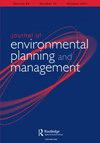A framework for assessing the sustainable transition potential of municipal climate change mitigation plans
IF 3.6
4区 经济学
Q1 DEVELOPMENT STUDIES
Journal of Environmental Planning and Management
Pub Date : 2023-10-04
DOI:10.1080/09640568.2023.2260090
引用次数: 0
Abstract
AbstractLocal climate change mitigation plans can be essential in enabling sustainability transitions at the municipality level. However, existing frameworks for assessing the quality of climate plans inadequately address their potential to foster sustainability transitions. We develop an assessment framework consisting of indicators and associated questions by integrating elements of the transition management framework with essential quality dimensions of climate plans and planning processes identified through a literature review. We illustrate and validate the assessment framework by applying it to the climate plans of three medium-sized cities in Switzerland. Our findings demonstrate that the local climate change mitigation plans performed well regarding the tactical and operational indicators but were less optimal concerning strategic and reflexive indicators. Nevertheless, the transition management framework provided a useful framework contributing to a comprehensive and systemic assessment highlighting the importance of stakeholder involvement, inter-sectoral coordination, and monitoring and evaluation as a means for social learning.Keywords: Climate change mitigationlocal climate action plansplan qualityassessment frameworktransition management AcknowledgementsThe authors would like to thank the two anonymous reviewers for their valuable comments and suggestions.Disclosure statementThe authors report there are no competing interests to declare.Notes1 Sustainability transitions refer to radical changes towards greater sustainability in central systems of production and consumption, which are needed to address the multiple current environmental crises, including climate change and biodiversity loss. Importantly, such changes necessitate not only new technologies, but also modifications in infrastructures, consumption patterns, rules and regulations, business models, etc. (Köhler et al. Citation2019). ‘Transitions management’ has long been recognized as a useful framework for understanding and influencing these complex long-term changes needed for cities to become sustainable in the future (Loorbach Citation2007; Loorbach, Frantzeskaki, and Avelino Citation2017), including the type of processes that are needed to engage in substantial local mitigation of GHG emissions.2 Due to the, in general, limited literature on LCAP quality, we have in addition to the dedicated mitigation action plans also included relevant studies that assess LCAP covering both mitigation and adaptation. In such cases, we have analysed the study with regard to the mitigation planning related findings.Additional informationFundingTeis Hansen acknowledges funding from the Research Council of Norway through FME NTRANS, grant 296205.评估城市气候变化缓解计划可持续转型潜力的框架
摘要地方气候变化减缓计划对于实现市政一级的可持续性转型至关重要。然而,评估气候计划质量的现有框架未能充分发挥其促进可持续转型的潜力。通过将过渡管理框架的要素与通过文献综述确定的气候计划和规划过程的基本质量维度相结合,我们开发了一个由指标和相关问题组成的评估框架。我们通过将其应用于瑞士三个中等城市的气候规划来说明和验证评估框架。我们的研究结果表明,地方气候变化减缓计划在战术和业务指标方面表现良好,但在战略和反思性指标方面表现不佳。然而,过渡管理框架提供了一个有用的框架,有助于进行全面和系统的评估,强调利益相关者参与、部门间协调以及作为社会学习手段的监测和评估的重要性。关键词:气候变化减缓;地方气候行动计划;质量评估框架;作者报告无利益竞争需要申报。注1可持续性转型是指生产和消费中心系统向更大可持续性方向的根本变化,这是解决当前多重环境危机(包括气候变化和生物多样性丧失)所必需的。重要的是,这种变化不仅需要新技术,还需要对基础设施、消费模式、规章制度、商业模式等进行修改(Köhler等)。Citation2019)。长期以来,“过渡管理”一直被认为是理解和影响城市未来可持续发展所需的这些复杂长期变化的有用框架(Loorbach Citation2007;Loorbach, Frantzeskaki, and Avelino引文(2017),包括参与大量减少当地温室气体排放所需的过程类型由于总体而言,关于LCAP质量的文献有限,除了专门的缓解行动计划外,我们还纳入了评估LCAP的相关研究,涵盖了缓解和适应两方面。在这种情况下,我们分析了与缓解规划有关的研究结果。teis Hansen承认挪威研究委员会通过FME NTRANS提供的资金,拨款296205。
本文章由计算机程序翻译,如有差异,请以英文原文为准。
求助全文
约1分钟内获得全文
求助全文
来源期刊
CiteScore
9.10
自引率
5.10%
发文量
155
期刊介绍:
Journal of Environmental Planning and Management has already established itself as a leading forum for up-to-date scholarly but accessible papers on all aspects of environmental planning and management. With contributions from leading international authors, the Journal publishes influential, high quality papers -an essential feature whether you are a subscriber, reader, contributor or all three. The Editors and International Editorial Advisory Board are drawn from around the world and are committed to encouraging researchers and practitioners to contribute to multidisciplinary and international debate in the field. The central aim is to focus on the integrated planning and management of the environment.

 求助内容:
求助内容: 应助结果提醒方式:
应助结果提醒方式:


